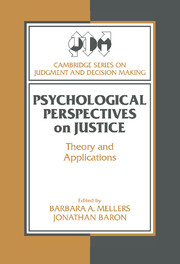Introductory Remarks
Published online by Cambridge University Press: 24 October 2009
Summary
Justice is a central problem in everyday life: We often assess the fairness of individual, interpersonal, and institutional acts. This book explores theoretical and applied questions about judgments of fairness. How do people make trade-offs between equality and efficiency, self-interest and cooperation, or short-term consumption and long-term savings? When are these trade-offs based on assumptions of deservingness? To what extent are they predictable from an observer's political point of view?
The chapters in this book provide a broad overview of current research on justice. Justice research is traditionally divided into three categories: retributive, distributive, and procedural. These categories distinguish among fair punishments and compensations, fair allocations of scarce resources, and fair methods or procedures. An alternative scheme, grounded in the decision making literature, categorizes justice research as normative, descriptive, or prescriptive. Normative research on justice focuses on rational theories for the general welfare of individuals within a society. Normative theories in this category are more diverse and span a broader range of perspectives than normative theories of individual decision making. Descriptive research on justice examines psychological theories of fairness and other measures of morality. Prescriptive research on justice investigates methods and policies for reducing conflict, encouraging cooperation, and resolving differences among individuals or groups. Because most of the chapters address more than one of the above categories, the book is organized around common themes: psychological questions, economic considerations, variations in perspectives on justice, and policy issues.
Common themes
Part II of the book examines psychological questions.
- Type
- Chapter
- Information
- Psychological Perspectives on JusticeTheory and Applications, pp. 3 - 8Publisher: Cambridge University PressPrint publication year: 1993
- 1
- Cited by



